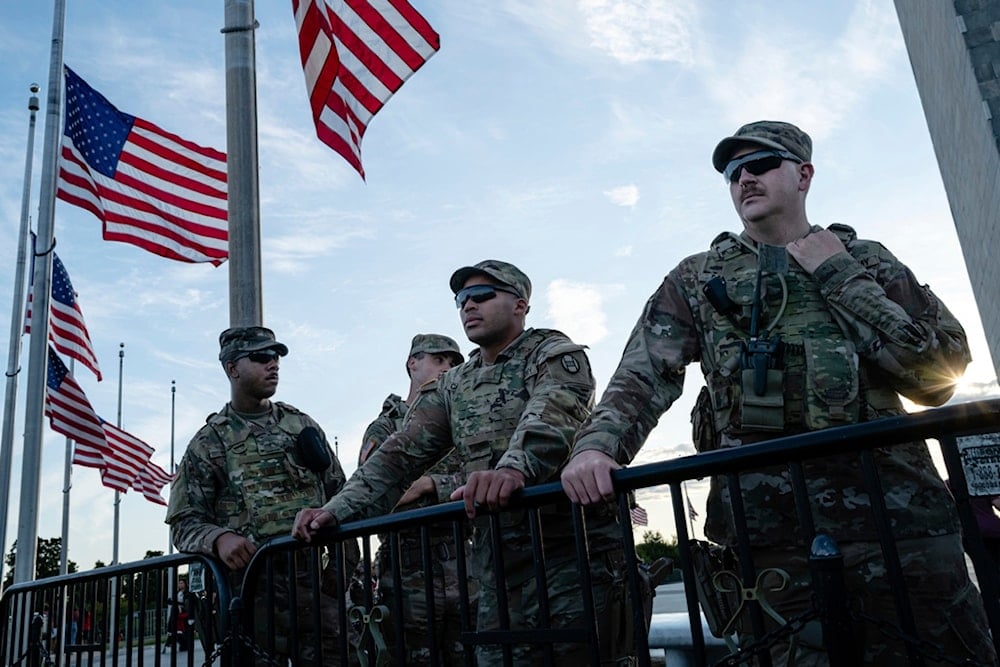Illinois governor calls Trump’s Chicago deployment plot an 'invasion'
Illinois Governor JB Pritzker blasted Trump’s plan to impose federal control in Chicago, calling it an “invasion” and warning of political motives.
-

Members of the South Carolina National Guard gather at the Washington Monument, Sunday, August 31, 2025, in Washington. (AP)
Illinois Governor JB Pritzker has sharply criticized US President Donald Trump’s proposal to impose federal control measures in Chicago, describing it as an “invasion” if carried out.
In an interview with CBS News on Sunday, Pritzker warned that Trump’s plan could involve deploying US troops to the city. “It’s clear that, in secret, they’re planning this, well, it’s an invasion with US troops, if they, in fact, do that,” the governor said.
Pritzker also suggested that Trump’s actions may be politically motivated, hinting at an attempt to disrupt Illinois’s 2026 gubernatorial and congressional elections.
Trump announced earlier on Sunday that if local authorities in Chicago fail to curb crime, he would take direct federal action. His comments follow an August 11 order to deploy National Guard troops to Washington, DC, amid what he described as a “public safety emergency.”
Wider federal intervention plans
According to Trump, Washington would be only the beginning. He pledged to expand federal measures to other major cities with high crime rates, including New York, Baltimore, Oakland, Los Angeles, and Chicago.
Chicago Mayor Brandon Johnson has voiced firm opposition, issuing a directive instructing city departments to resist any potential federal intervention. The order, however, has been described as largely symbolic given its vague language and the limits of municipal authority in the face of federal decisions.
The debate over federal intervention has heightened tensions between Trump’s administration and Illinois officials, with concerns growing over both constitutional limits and political implications.
Trump wants to deploy National Guard in Chicago
Pentagon officials have been developing plans for weeks that could send "at least a few thousand members of the National Guard" to Chicago, America’s third-largest city, according to The Washington Post on Sunday. Options include large-scale deployments, with the possibility of active-duty troops also under discussion, though considered less likely at this stage.
Speaking from the Oval Office, Trump left no ambiguity about his intentions. “Chicago’s a mess. You have an incompetent mayor. Grossly incompetent,” he told reporters. “And we’ll straighten that one out probably next. That’ll be our next one after this. And it won’t even be tough.”
The potential Chicago National Guard deployment would mirror Trump’s earlier controversial move in Los Angeles, where he sent 4,000 National Guard troops and 700 active-duty Marines despite opposition from local leaders. CNN reported that Trump has also suggested using “regular military” forces, a step that would represent an even more dramatic escalation.
Chicago is not the only focus of Trump’s domestic military expansion. Currently, more than 2,000 National Guard troops patrol Washington, DC, following Trump’s takeover of the city’s police force in August. Defense Secretary Pete Hegseth has also authorized these troops to carry firearms while patrolling the streets, marking another escalation.
Constitutional and legal concerns over Trump’s use of force
Legal scholars have raised alarms over Trump’s military deployment strategy within US borders. Elizabeth Goitein of the Brennan Center for Justice warned that preemptive military deployment “is the hallmark of authoritarian rule.” William Banks, a law professor at Syracuse University, noted that military leaders who once acted as restraints on Trump have now been replaced by “sycophants.”
Steve Vladeck of Georgetown University told USA Today that while the administration claims to operate within the law, it is "pushing the law’s boundaries further than any president in modern history." Many experts believe Trump’s justification for deployments appears pretextual, politically motivated, rather than rooted in genuine security needs.
The states have taken the matter to the courts. For one, California has argued in federal court that Trump’s Los Angeles deployment violated the Posse Comitatus Act of 1878, which limits military involvement in civilian law enforcement. Although a federal judge initially agreed, an appeals court has allowed the deployment to continue.

 4 Min Read
4 Min Read








